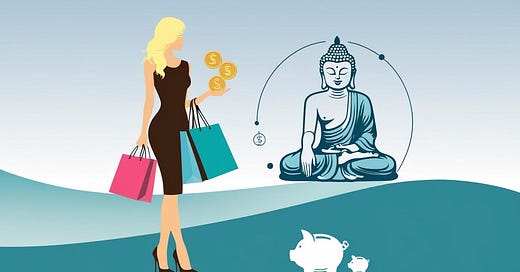"I’ve spent $40,000 on shoes and I have no place to live?! I will literally be the old woman who lived in her shoes.”
– Carrie Bradshaw - Sex and the City
I can’t help but think back to *Sex and the City* and that unforgettable moment when Carrie Bradshaw realized she had spent $40,000 on shoes—but couldn’t afford the down payment to buy her apartment. It was a cringeworthy yet relatable scene, especially for those of us who’ve made similar financial missteps in our younger years. I know I have. That moment stuck with me, and it shaped how I approach money today. It’s also why I’ve made it a mission to teach my daughter—and now, women like you—how to break free from the cycle of consumerism.
Fast forward to 2025, and I’ve come to realize that the answer was always there: spending less, not earning more. The no-spend movement is more than just a trend; it’s a revolution—a powerful shift in how women are reclaiming control over their finances, their choices, and their futures. As inflation continues to challenge household budgets, this movement is gaining momentum, offering women a roadmap to financial freedom through mindful consumption.
Now let’s explore how this transformative approach is reshaping lives and redefining what wealth truly means.
Recent data shows that women now control $31.8 trillion in global purchasing power, influencing 93% of food purchases, 80% of healthcare decisions, and 91% of home buying choices. Yet despite this tremendous economic influence, many women feel disconnected from their financial confidence, with targeted marketing creating constant pressure to consume. The no-spend movement offers a compelling alternative.
The Evolution of Mindful Consumption
The no-spend concept has evolved dramatically since its origins with Buy Nothing Day in 1992. What began as isolated blogger experiments has transformed into a mainstream social media phenomenon, with #NoBuy2025 generating over 25,000 posts on TikTok alone. This growth reflects deeper economic and cultural shifts affecting women's relationship with spending.
"The movement has gained such traction because it addresses both practical financial concerns and deeper psychological needs," explains financial psychologist Dr. Mariana Chen. "Women are not just looking to save money—they're seeking freedom from the constant pressure to consume."
The timing of this movement is particularly significant. With inflation remaining stubborn through early 2025 and housing costs continuing to climb, women are feeling the squeeze on their finances from multiple directions. Additionally, the psychological impact of economic uncertainty has made many more conscious of their spending habits.
What distinguishes today's no-spend revolution from simple frugality is its emphasis on mindfulness rather than deprivation. "This isn't about never buying anything again," says financial educator Tara Rodriguez. "It's about breaking the automatic spending cycle and making intentional choices aligned with your true values and financial goals."
If you received value from this newsletter, consider a gift option for your daughters, granddaughters, mom, grandma, female family members, friends, and colleagues. Remember that empowered women, empower women and entire communities. Help me do this!
The Female Financial Powerhouse
Women's economic influence cannot be overstated. Despite controlling 85% of consumer spending decisions, many women feel misunderstood by advertisers, with 91% reporting that marketing messages don't resonate with their actual needs and values.
This disconnect creates an opportunity for a different approach to consumption. The no-spend movement encourages women to recognize and reclaim their financial power by becoming more conscious of how marketing tactics specifically target their insecurities and social conditioning.
"Women are often positioned as the primary shoppers for their households, which creates both responsibility and psychological burden," notes consumer psychologist Dr. Elise Thompson. "The no-spend approach helps women step back from reactive purchasing and into proactive financial management."
The relationship between spending and self-worth is particularly relevant for women. Social media platforms have intensified the connection between consumption and identity, creating constant comparison and feelings of inadequacy that can drive emotional spending.
Designing Your Personal No-Spend Plan
Keep reading with a 7-day free trial
Subscribe to Chica Wealth Builders' Substack to keep reading this post and get 7 days of free access to the full post archives.




